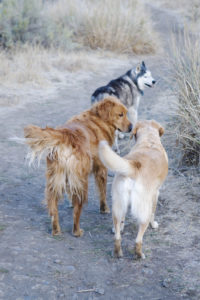 We all want our dogs to be friendly to other dogs—and shouldn’t it come naturally? Dogs are social, after all. So why does an otherwise sweet-natured canine buddy turn into a killjoy at the park? One reason is that dogs can be introverts, too. Like humans, they can have bad days and they occasionally form instant dislikes to certain dogs, or feel uncomfortable meeting strangers. But we get to choose our friends and are free to avoid anyone we can’t stand. Dogs pretty much have to go wherever we take them. And, some dogs can be territorial creatures, protective of their favourite things, or protective of us. Adding another dog to the equation, familiar or not, always holds the potential for fireworks.
We all want our dogs to be friendly to other dogs—and shouldn’t it come naturally? Dogs are social, after all. So why does an otherwise sweet-natured canine buddy turn into a killjoy at the park? One reason is that dogs can be introverts, too. Like humans, they can have bad days and they occasionally form instant dislikes to certain dogs, or feel uncomfortable meeting strangers. But we get to choose our friends and are free to avoid anyone we can’t stand. Dogs pretty much have to go wherever we take them. And, some dogs can be territorial creatures, protective of their favourite things, or protective of us. Adding another dog to the equation, familiar or not, always holds the potential for fireworks.
Why are some dogs more social than others?
Genetics and breed play a role, and so does early socialization. We can use a human analogy here too. Some of us come out of the womb gregarious, others are born shy and unsure of how to negotiate the dynamics of social groups. We also are greatly affected by our earliest experiences. An otherwise confident and social child finding herself the target of bullies on the playground could be forever changed as a result.
What does friendly look like?
While walking your dog on-leash think of what I call “elevator manners” – there is an acknowledgement of the other dog’s existence but no real interaction. There should be no staring, no talking (barking or growling), and no grabbing. Imagine how you would feel if you were on an elevator and somebody got on and stared at you. Then he started talking to you (not just something like ‘what floor would you like?’, but something obnoxious). And what if this person touched you or grabbed you, not inadvertently, like in a crowded elevator, but deliberately? Are you freaked out yet?
We can’t expect our dogs to love everyone. But, we should expect them to exist in the same sphere without incident. If your dog’s anti-social tendencies go beyond polite disinterest and elevator manners are non-existent, then adult rehabilitation is an option. Working through a program to build positive associations to other dogs using rewards and comfortable distances can greatly improve relations between your dog and others.
Be aware of who your dog really is.
If your dog is civil to most dogs but doesn’t play, or gets grumpy when approached by bouncy youngsters, a bit of situational awareness might be all that’s needed: choose open spaces and quieter trails for walks; cross the street if there isn’t room to circumnavigate another dog on a sidewalk; give your dog some space by heading up a neighbour’s driveway as a rambunctious adolescent passes by. After all, shouldn’t your dog be given a break and allowed to be who he or she really is?

0 Comments